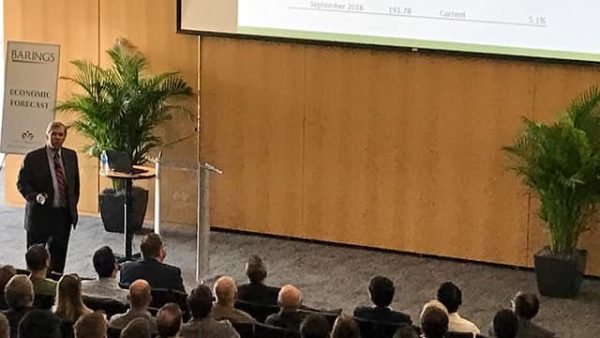Slow economic growth expected to continue in 2017

The economy is continuing to grow, albeit slowly. Post-election and throughout 2017, the economic forecast pattern will continue, said UNC Charlotte economist John Connaughton Dec. 7 during the Barings/UNC Charlotte Economic Forecast.
“During the first half of 2016, the North Carolina economy seemed to experience slower growth than during the previous 18 months. What has been happening in North Carolina during the first half of 2016 is not dissimilar to what has happened in the U.S. It seems that after seven years of economic expansion, the economy has begun to slow. The U.S. economy has been expanding for 89 months, which represents the fourth longest economic expansion on record out of the 33 expansions that have been tracked by the NBER since 1854,” Connaughton said.
Connaughton stated despite an expected increase in interest rates by the Federal Reserve, key indicators for the economy are strong, including the stock market and consumer spending.
“The November Consumer Confidence Index was at 107.1, the highest level since the Great Recession began. This, along with the general bump associated with the election, should increase consumer spending over the next several months, providing an offset to increased interest rates,” he said.
Connaughton expects that the economy will not experience a significant change in the growth pattern through 2017. In 2017, the North Carolina economy is expected to increase by an inflation-adjusted rate of 2 percent over the 2016 level.
“Positive economic growth in 2017 would represent the eighth consecutive year of economic growth for the North Carolina economy,” said Connaughton. “While this is an impressive trend of growth, the size of that economic growth has been somewhat lacking. In fact, for most of the 21st century, both the U.S. and North Carolina economies have been unable to achieve an average 3 percent real GDP growth rate that had been fairly consistent since World War II. The 2.5 percent real growth rate experienced over the 2014-2015 period was stronger than the recent past, but the slower growth expected in 2016 could signal a return to the slow growth pattern.”
Notably, Connaughton said that GDP growth will only be possible though productivity growth measures, as labor force growth has been stagnate for many years through the retirement of the Baby Boomer generation.
Connaughton presented his quarterly forecast to members of the Charlotte business community and the media at a luncheon held at UNC Charlotte Center City. The forecast is funded by Barings, a global asset management firm that has more than 1,700 associates and offices in 17 countries.